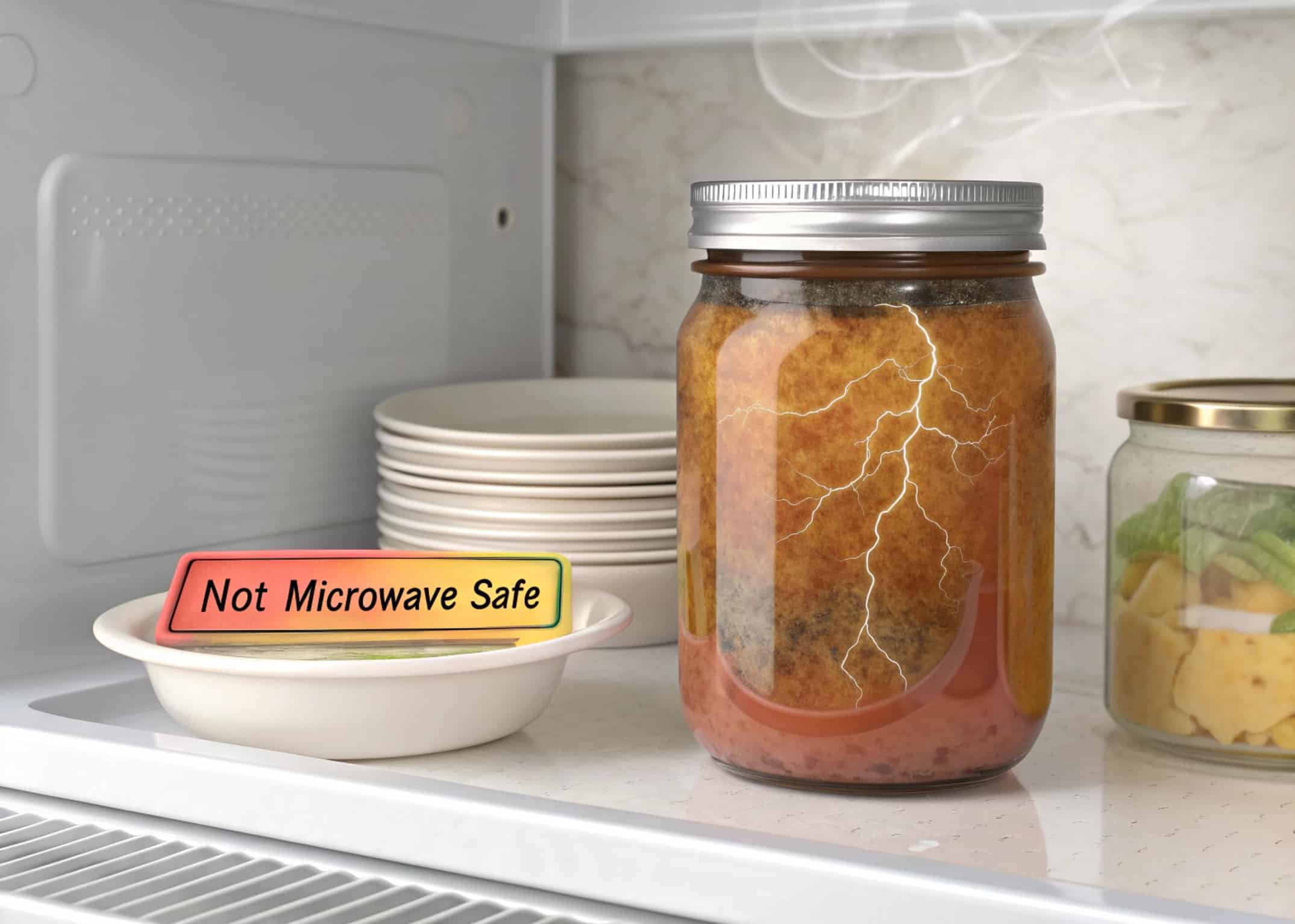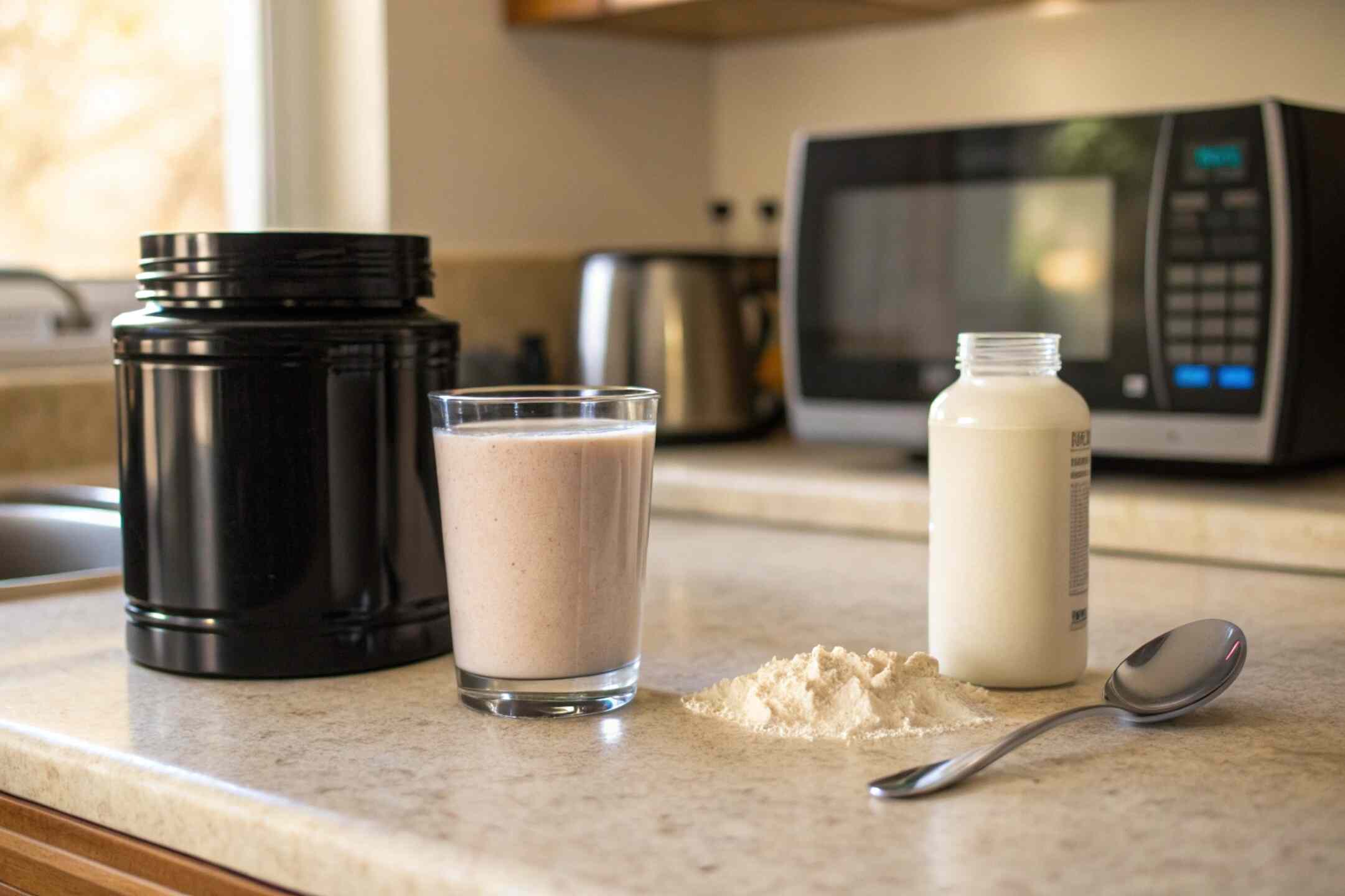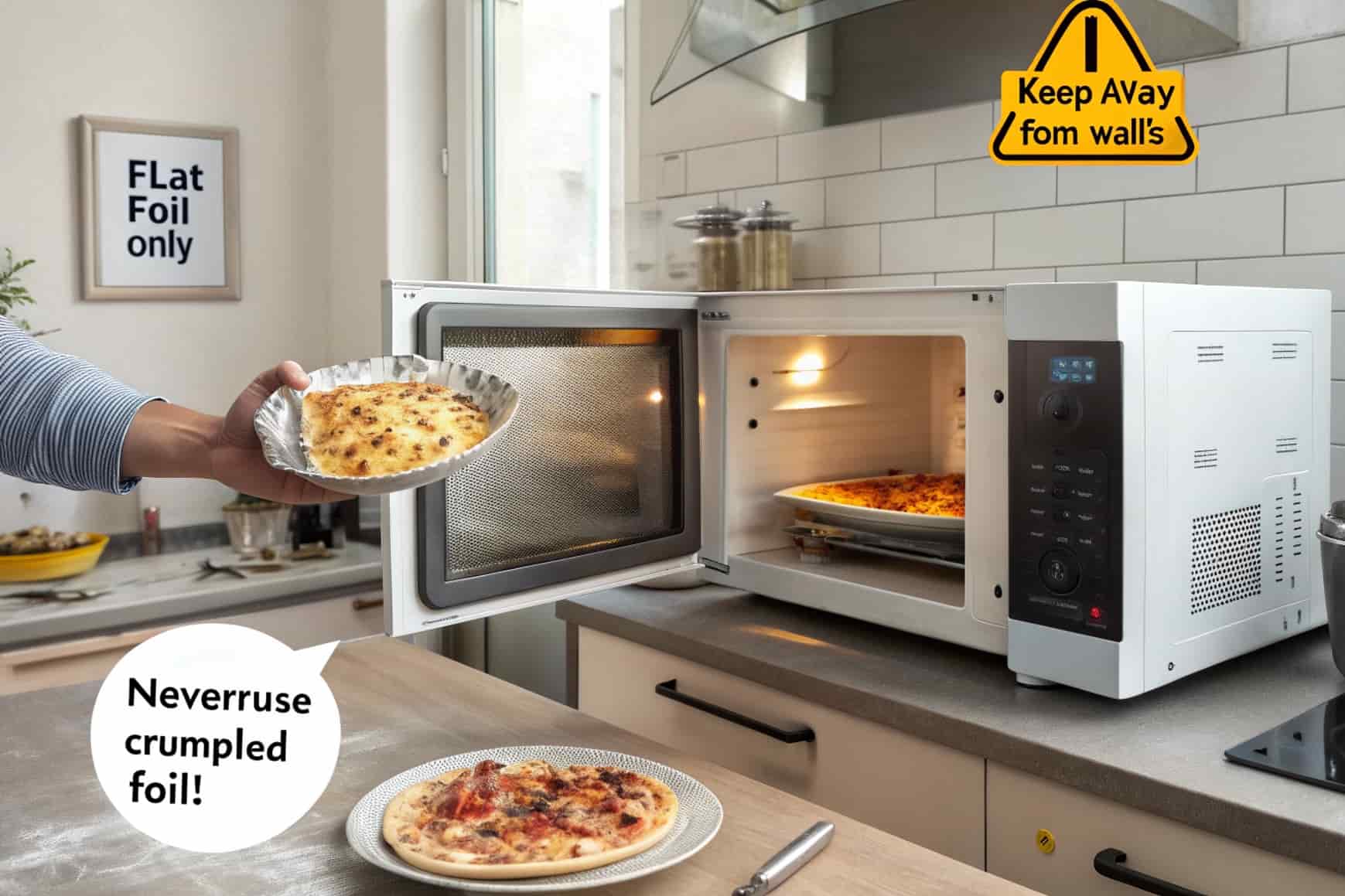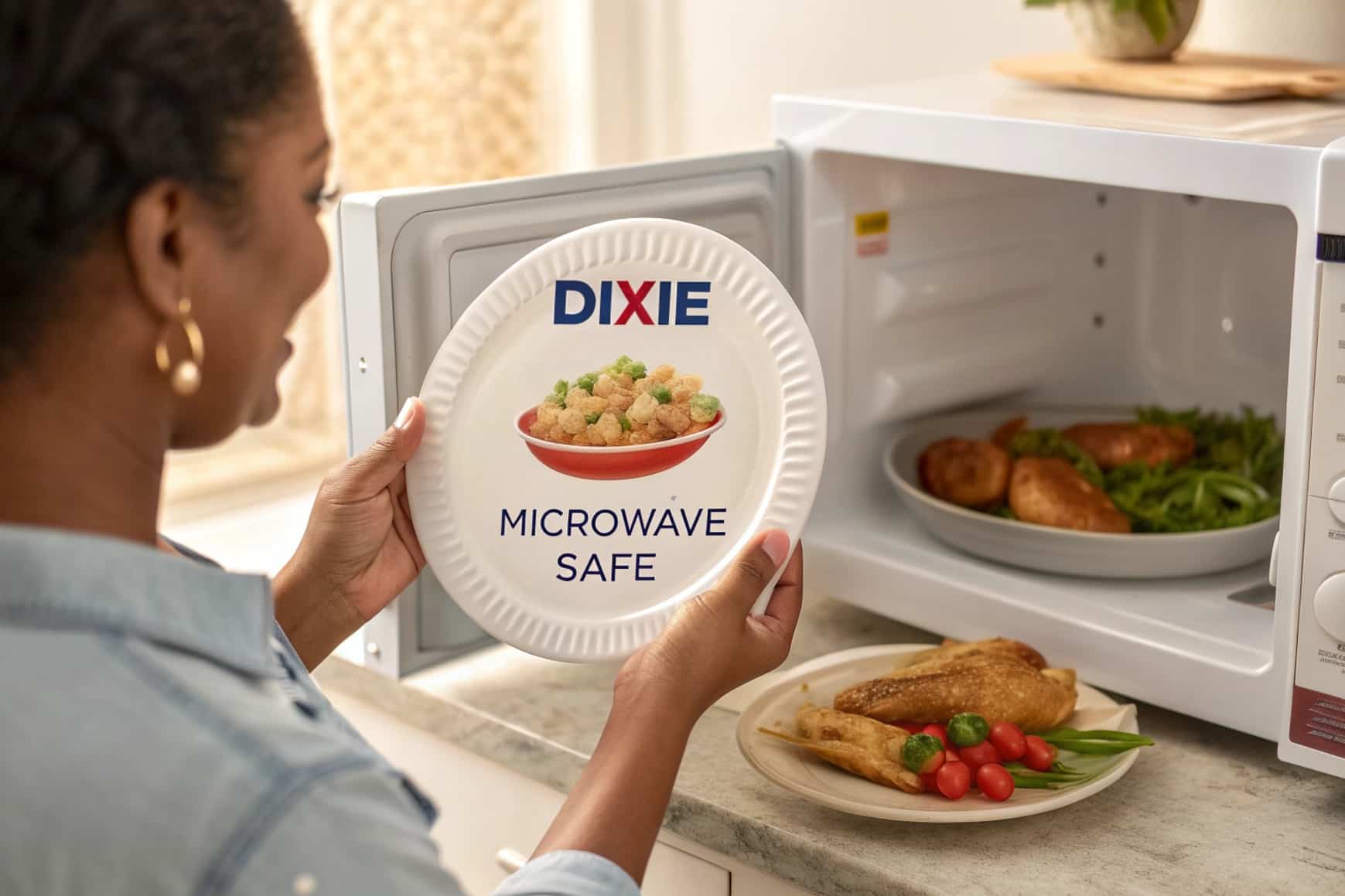Mason jars have been around for decades, with their charm and versatility making them a favorite for many people. From canning to decoration, storage to DIY projects, these jars are undoubtedly a staple in many households. But one question that often arises is whether or not Ball Mason jars are microwave safe. After all, they’re so convenient for storing food and leftovers, and the idea of quickly reheating something in a Mason jar seems appealing.
In this article, I’m going to share my personal experience with using Ball Mason jars in the microwave, as well as provide a thorough explanation of why they might or might not be safe for microwave use. So, let’s get into it!
Are Ball Mason Jars Really Microwave Safe?
First, let’s understand a little about Ball Mason jars. These classic glass containers have been trusted for generations, mainly for canning and preserving fruits, vegetables, and homemade jams. But even though they are commonly used in homes, that doesn’t automatically mean they are safe for the microwave.
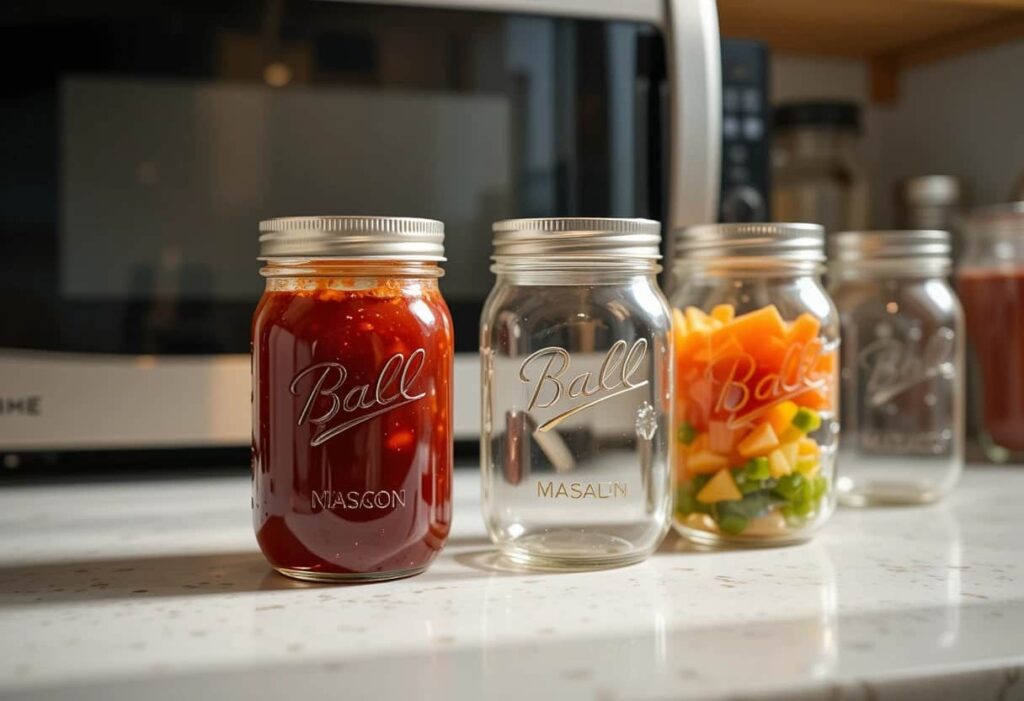
Some people online have asked, “are Ball Mason jars microwave safe Reddit?” and the answers are often mixed. While some users say they’ve had no problems microwaving them, others share warnings or experiences where jars cracked due to sudden heat changes.
Why does Ball advise against using Mason jars in the microwave?
Ball® manufactures their Mason jars from a type of glass called annealed glass. This glass is designed to be strong but not necessarily suited for rapid temperature changes. For example, when heated in the microwave, the glass might experience thermal shock and could break or shatter due to uneven heating.
Ball® specifically advises against using their canning jars in a microwave oven. This is crucial information because, like many people, I also assumed that since Mason jars are commonly used for storage and heating food, they should be microwave safe. However, when I dug into the manufacturer’s guidelines, I found that this was not the case. So, if you have Ball® canning jars, I recommend avoiding microwaving them.
How to Use Mason Jars Safely in the Microwave?
While Ball jars may not be ideal, if you’re using other microwave-safe Mason jars, follow these precautions:
- Check the jar first. Make sure there are no cracks, chips, or damage before microwaving.
- Use a microwave-safe lid or cover. Avoid messes and ensure better heating by covering the jar with a microwave-safe lid or plate.
- Avoid sudden temperature changes. Don’t move mason jars directly from the fridge or freezer into the microwave. Let them warm up to room temperature first to prevent cracking.
Features of Using Mason Jars in Different Ways:
Mason jars have become much more than just containers for canning. Their versatility and practicality allow for a wide range of uses beyond the kitchen. Here are some features of Mason jars when used for different purposes:
Oven Use for Mason Jars:
Although not recommended for baking by Ball® Mason jars, certain other types of Mason jars can withstand oven heat. This feature makes them great for creating visually appealing baked goods, like individual pies or cakes, especially if you avoid temperature shocks. If the jars are oven-safe, they offer a creative way to serve or bake in small portions.
Freezer Storage with Mason Jars:
Mason jars excel in freezer storage, as their thick glass helps preserve the quality of food. Their ability to handle frozen soups, sauces, and fruits makes them ideal for long-term storage. The feature that sets them apart is the wide-mouth design, which allows for easy removal of frozen contents, while ensuring there’s room for expansion, preventing any cracking issues when freezing liquids.
Craft Projects with Mason Jars:
The aesthetic appeal of Mason jars extends far beyond storage. With their classic design, they are perfect for DIY crafts. Whether you want to make a unique vase, a personalized candle holder, or seasonal decor, Mason jars offer a durable, customizable base for all types of craft projects. The variety of uses and easy customization options make them a favorite for creative individuals.
DIY Gifts Using Mason Jars:
Mason jars have the charming feature of being ideal for creating DIY gifts. Their design adds a rustic, personal touch to homemade creations. From cookie mixes and bath salts to candles or even plant pots, Mason jars can be easily transformed into thoughtful gifts. Their capacity for being filled with goodies while also acting as a decorative container adds a unique, personalized element to any gift-giving occasion.
Why Aren’t Ball Mason Jars Microwave Safe?
You might be wondering why Ball Mason jars can’t handle the microwave. The main issue lies in the type of glass used. Annealed glass, which is commonly used for these jars, isn’t designed to withstand rapid heating and cooling. This glass can’t handle the quick temperature fluctuations that occur when microwaving food.
In contrast, microwave-safe jars are made from tempered glass. This glass is specially treated to withstand thermal shock, meaning it won’t break or crack under sudden temperature changes. Without this treatment, you’re taking a risk by microwaving a jar that isn’t designed for it.
Why Choose WEILI Global Microwaves?
At WEILI Global, we are committed to providing microwaves that are safe, reliable, and user-friendly for all your daily cooking needs. Whether you’re heating up food in a mason jar or preparing a complete meal, our microwaves ensure even and efficient heating every time.
Key Features of WEILI Global Microwaves:
- Pre-set cooking programs for a variety of food types
- Safe defrosting options to thaw food evenly without overcooking
- Multi-function cooking – including air frying, steaming, and reheating
With these smart features, our microwaves make it easier to prepare food safely and quickly, without sacrificing taste or texture. From reheating leftovers to cooking healthy meals, WEILI Global microwaves are designed to make your kitchen tasks faster, safer, and more convenient.
What Happens If You Microwave a Ball Mason Jar?
I’ll be honest with you—I’ve tried using a Ball Mason jar in the microwave a few times, and it’s not something I would recommend. At first, I thought it would be fine because I was just reheating some soup or leftovers, but after a couple of times, I noticed that the glass started getting way too hot to handle, even with oven mitts. One time, I nearly burned my hand trying to take it out, and that’s when I started questioning the safety of microwaving these jars.
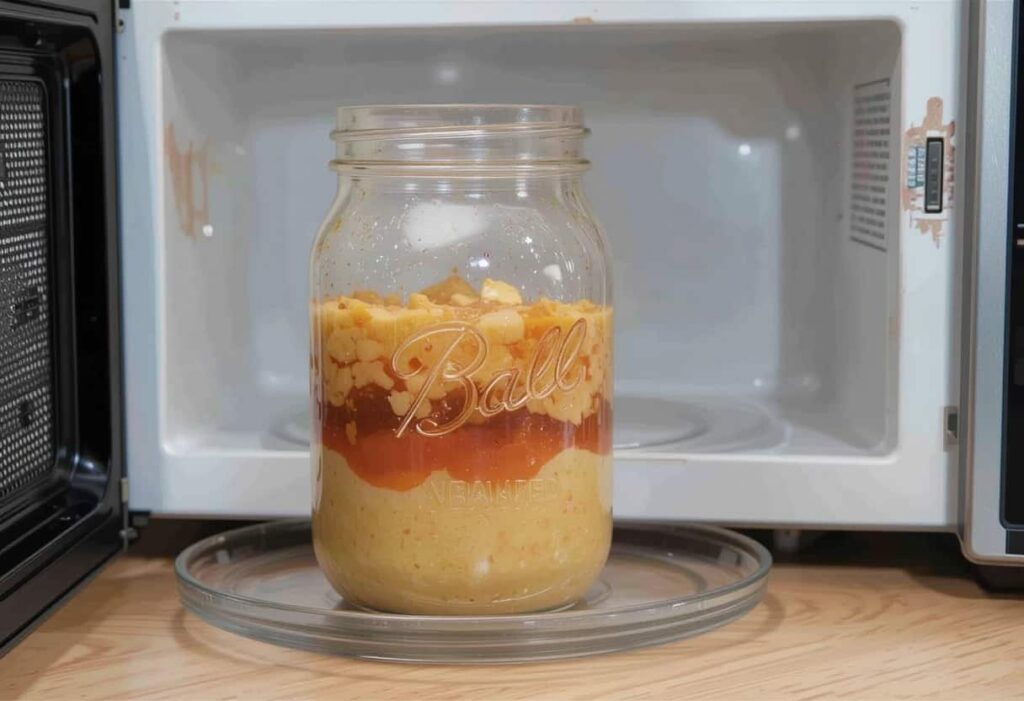
More importantly, I found that the jar often didn’t heat the food evenly. Some parts of the jar would be cool, while others would be scalding hot. I’ve also heard of jars cracking or breaking when used in the microwave due to the rapid heat distribution. It’s definitely not an experience I want to repeat, and I’ve since stopped using Mason jars in the microwave altogether.
Are There Any Mason Jars That Are Microwave Safe?
Not all Mason jars are created equal, and some newer models are actually made from tempered glass, which makes them microwave-safe. When purchasing Mason jars, look for a symbol or a label indicating that the jar is safe for microwave use. Manufacturers who create these microwave-safe jars take extra care to design the glass to handle the heat and pressure of microwaving food.
In my experience, finding a Mason jar labeled as “microwave safe” is a much better option if you’re looking to use them for heating food in the microwave. But again, it’s important to remember that even microwave-safe Mason jars still require some precautions.
Alternatives to Microwaving Ball Mason Jars:
If you’re still not convinced about using Mason jars in the microwave, there are plenty of safer alternatives. Here are some options I’ve tried:
- Microwave-Safe Glass Containers: There are many glass containers specifically designed for microwave use, such as the Rubbermaid Brilliance Glass Storage Set. These containers are designed to withstand both heating and cooling without cracking, making them a reliable alternative to Mason jars for microwaving food.
- Ceramic Microwave Containers: Ceramic containers are another great option for reheating food in the microwave. They heat food evenly and safely. Unlike glass, ceramic distributes heat more gradually, minimizing the risk of cracking, making it a dependable choice for microwave heating.
- Plastic Microwave-Safe Containers: If you prefer plastic, look for BPA-free containers that are labeled as microwave-safe. I’ve used Rubbermaid plastic containers, which work great for reheating leftovers. These containers are durable, safe for the microwave, and typically more affordable than glass or ceramic options.
Can Mason Jars Be Used in Other Ways?
If you’ve been using Mason jars for microwave purposes, it might be time to explore other ways you can use them. There are plenty of alternatives for reheating and cooking food, but Mason jars still have a lot to offer in terms of storage and other creative uses.
Oven Use for Mason Jars:
While Ball Mason jars aren’t recommended for baking, other types of Mason jars can handle the oven. It’s important to avoid sudden temperature changes, as thermal shock can cause the glass to break. Some Mason jars are designed to withstand heat, but it’s essential to check the manufacturer’s guidelines. Always preheat your oven and never place a cold jar directly into a hot oven.
Freezer Storage with Mason Jars:
Mason jars are excellent for freezing food. You can store soups, sauces, fruits, and even smoothies in them. However, it’s important to leave some space at the top of the jar to allow for the contents to expand as they freeze. Using wide-mouth jars is ideal for easy removal of frozen items. Just be cautious with abrupt temperature shifts to avoid cracking.
Craft Projects with Mason Jars:
Mason jars are fantastic for craft projects, beyond just food storage. They can be used as candle holders, vases, or even Christmas decorations. You can personalize them with paint, fabric, or other materials to create something special. From organizing small items like buttons to creating beautiful centerpieces, the possibilities for crafting with Mason jars are nearly endless.
DIY Gifts Using Mason Jars:
Mason jars make wonderful DIY gifts. I’ve personally used them for creating homemade bath salts, cookie mixes, and decorative gift holders. You can fill them with personalized goodies or even use them as plant pots. The charm of Mason jars as gifts is that they can be personalized and customized to fit any occasion, making them a thoughtful and creative way to give something special.
Safety Concerns When Microwaving Mason Jars:
Mason jars are popular for food storage and home canning. Most of them come with a microwave-safe symbol, which means they can generally be used in the microwave. However, there are a few safety points to keep in mind:
- Only use mason jars for quick heating. Items like soup, cheese dips, or pre-cooked pasta can be heated safely in a mason jar. But remember, the glass can become very hot quickly.
- Always remove the metal parts. Mason jars come with metal lids, seals, and rings, which should never be placed in the microwave.
- Watch for glass damage. If a jar is cracked or chipped, it could break or even explode in the microwave due to sudden heat expansion. This can be dangerous and also damage your microwave.
Tips for Using Microwave-Safe Mason Jars:
If you do find a microwave-safe Mason jar or are using one that is designed for microwave use, here are a few tips I learned the hard way to ensure that you’re doing it safely:
- Leave Room for Expansion: When microwaving food in a Mason jar, always leave enough room at the top for the contents to expand as they heat. This helps prevent pressure buildup, which could cause the jar to break.
- Remove the Lids and Metal Components: Don’t microwave the metal lids that come with most Mason jars, even if they’re made of stainless steel. These can cause sparking, damage your microwave, or even start a fire.
- Microwave in Short Intervals: I found that it’s best to microwave in shorter bursts of time. This gives the jar and its contents time to heat evenly. Don’t try to heat food for a long time in one go.
- Use Oven Mitts: Even when using microwave-safe jars, they can get extremely hot. I recommend using thick oven mitts or a towel when handling them.
- Don’t Microwave Frozen Foods: Even if the jar is microwave-safe, don’t microwave frozen food in it. I’ve made this mistake and it’s a recipe for disaster. The rapid heat change can cause the glass to crack or shatter.
Future Plans for Using Mason Jars:
In the future, Mason jars may also become increasingly smart, with features like temperature sensors or built-in lids that automatically seal when needed. As more brands innovate with microwave-safe designs, we could see a rise in safe, convenient ways to use Mason jars in the microwave. With sustainability and multifunctionality at the forefront, Mason jars are set to remain an essential tool in kitchens, homes, and craft spaces, offering endless possibilities for storage, cooking, and creative projects.
Additionally, they could be incorporated into smart kitchens, syncing with apps to track contents or expiration dates. The rise of biodegradable materials may also lead to eco-friendly Mason jars that break down over time. As we continue to look for more sustainable and efficient alternatives, Mason jars are poised to play a significant role in shaping the future of home organization and creativity.
FAQS:
1. Can you microwave Mason jars safely?
Mason jars are generally not microwave-safe unless labeled as such. Standard jars, like Ball® canning jars, are made from annealed glass, which can crack under microwave heat. Always check for a microwave-safe symbol or the manufacturer’s instructions to ensure safety.
2. How do you properly freeze food in Mason jars?
When freezing food in Mason jars, leave extra space at the top for expansion. Use wide-mouth jars for easier removal and make sure the jars are labeled freezer-safe to prevent cracking. Always allow room for food to expand during freezing.
3. Are Mason jars safe to use for baking?
Ball® jars are not recommended for baking. However, some Mason jars are designed to withstand oven temperatures. Avoid rapid temperature changes (e.g., from freezer to oven) to prevent cracking. Always check the jar’s labeling to ensure it’s oven-safe before use.
4. Can Mason jars be used for homemade beauty products?
Yes, Mason jars are perfect for storing homemade beauty products like bath salts, scrubs, and lotions. Their airtight seal ensures freshness, and their clear glass makes them visually appealing. They also serve as eco-friendly and reusable containers for DIY beauty projects.
5. How can I remove metal lids and seals from Mason jars without damaging them?
To avoid damage, remove metal lids and seals before washing Mason jars. Hand wash with a soft cloth to prevent scratching or corrosion. Dry the metal parts completely to prevent rust, and avoid putting them in the dishwasher to extend their lifespan.
Conclusion:
Ball Mason jars are not microwave safe due to the risk of thermal shock, which could cause them to break or shatter. The annealed glass used in these jars isn’t designed to handle rapid temperature changes typical of microwaving. To ensure safety, it’s best to use microwave-safe containers specifically designed for heating.
Exploring alternatives such as microwave-safe glass, ceramic, or BPA-free plastic containers can provide safer options for reheating food. Always check the manufacturer’s guidelines for microwave compatibility before using any container.
Related post:
